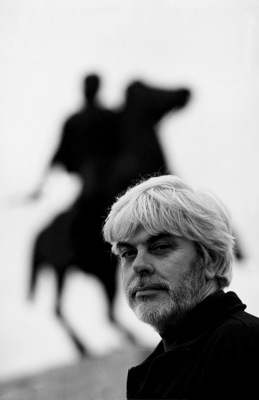 Inquiring for the tomb of Alexander the Great
Inquiring for the tomb of Alexander the Great
“I believe that the “alabaster tomb” in the Latin cemetery of Alexandria discovered by Italian archaeologists Breccia and Adriani is actually what is left of the king’s tomb.”
The discovery of the tomb of Alexander the Great would be one of the greatest archaeological discoveries of all time. There were many archaeologists who have dreamed about that and were convinced that their efforts had revealed the final resting place of the Macedon leader. To realize after all, that their dreams were false…
Elpida Pasamichali
The Italian novelist Valerio Massimo Manfredi, author of the famous fictional trilogy about Alexander the Great, which was a worldwide best seller and translated into 36 languages, signs with his status, that of the archaeologist, a new book about Alexander. A book, that attempts to solve the mystery of his tomb.
In his new book entitled “Alexander the Great, the secret of his tomb,” Manfredi, an acknowledged Italian writer, journalist, historian and archaeologist, who defines himself as an “Ancient World Topographer”, chronicles the story of the death of Alexander and all the efforts to identify his tomb so far, through grave hunters up to archaeologists…
Valerio Massimo Manfredi, who has participated in several excavations in the Mediterranean and the Middle East and is a professor of Archaeology at Luigi Bocconi University in Milan, talks about Alexander, the mystery of the tomb and presents his own theory on the point which is buried.
Having already written three novels about Alexander, how did you decide to write a book about the “secret” of his tomb?
Because I like to come back to scientific research, and because several books have been recently published on this subject, so I felt like making my point about it. Some of the hypothesis’ that I have read were kind of weird and I found it interesting to retrace the entire itinerary of research and bring up my personal point of view.
 How do you explain the failure of archaeologists to discover the tomb of Alexander?
How do you explain the failure of archaeologists to discover the tomb of Alexander?
I don’t think that it is a failure of the archaeologists: the problem is that the city suffered so many disasters, invasions, pillaging, natural catastrophes, religious riots, that it would have been a miracle if the tomb had survived intact.
Of all the attempts to locate the tomb, you mention in your book, what do you consider most reliable?
I believe that the “alabaster tomb” in the Latin cemetery of Alexandria discovered by Italian archaeologists Breccia and Adriani is actually what is left of the king’s tomb. It is a Macedonian tomb for sure and of the most archaic kind and since we know from Lucan that the tomb of the Ptolemies were “pyramids and mausoleums” this one should be the tomb of Alexander.
If finally the tomb of Alexander discovered, would change the image that humanity has for him?
Not really. Seventeen years ago, professor Andronikos found the tomb of King Philip in Verghina completely intact, with so many marvellous and precious artefacts but nothing that would modify the idea that we have of Alexander’s father.
 What symbolizes the personality of Alexander for the modern Western man, in your opinion?
What symbolizes the personality of Alexander for the modern Western man, in your opinion?
His quest for immortality, his anxiety for the Infinite, and the idea that there is no task that can’t be achieved.
What they say about Alexander, your students in the University?
They are fascinated by his personality and struck by awe when I tell them: He was about your age when after the battle of Issus he had become virtually the most powerful man in the world.
Alexander was, in your opinion, creation of his time? A figure of this magnitude could occur today?
We shouldn’t forget that a big part of History is created by its chaotic components and this sort of elements, just occur by chance. The Romans for instance couldn’t understand this thing: if they had defeated the Macedonians and the Macedonians had defeated the Persian, why couldn’t they defeat the Persian as well?
Do you think the world would be different if Alexander did not die so young?
Probably yes, I think so. But this is a kind of speculation that we shouldn’t do. As Historians we can investigate only on things that actually happened; not on things that never occurred.
You have written more than fifteen historical novels. Why do you find so fascinating historical fiction?
This is not really so. Almost half of my novels are set up in the present or in a very near past and i have published book of short stories that are set in any time and situations. Furthermore “Historical fiction” is just a nonsense. From one side it would be impossible to write something that is not historical since everything belongs to history even what we have done five minutes ago. On the other side what you call historical fiction is not historical at all. Its just a particular kind of literary expression because the author speaks like as if was the only surviving witness of what he is narrating and in control of the only truth.
What is the issue of your next book?
My next novel is about events that occurred between 1914 and 1949 in a little town, almost insignificant. A fantastic story.
You are a historian, an archaeologist and a journalist. What attracts you most about writing novels?
The possibility to live any kind of life, in any place of this world, in any time and situation and experiment emotions, that I wouldn’t have ever known in my real life.
INFO
Greek Release of “Alexander the Great, the secret of his tomb” by PSICHOGIOS PUBLISHERS
Η συνέντευξη στα Ελληνικά
Σχετικά Θέματα (Links)
VALERIO MASSIMO MANFREDI: «Ένας τοπογράφος του αρχαίου κόσμου»

